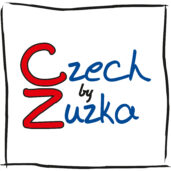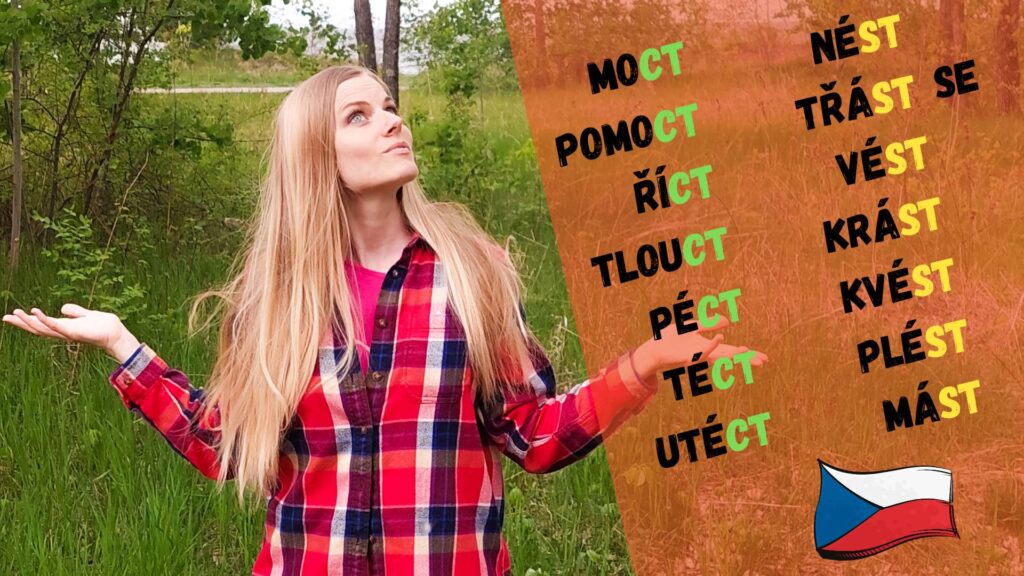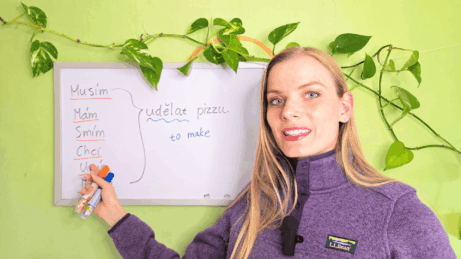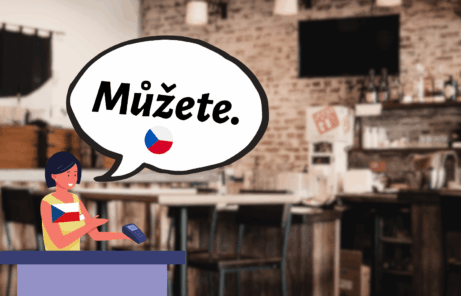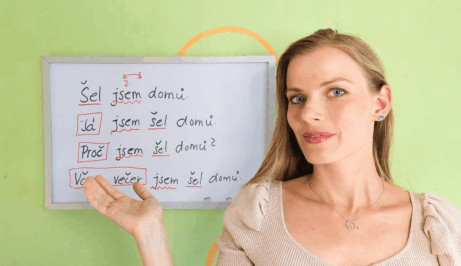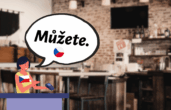
Don’t Get Intimidated by These Verbs
Watch a video lesson about this topic here.
My students give me endless inspiration for learning videos. In one of my lessons the other day, my student and I somehow got to the verb mást (to confuse). She said, “I have never heard of such a verb.” Truth be told, it is more common to come across the adjective matoucí (confusing) than the verb itself. But you can also say: Tohle me mate. – This confuses me.
It is not the first time a student asks me about a verb that finishes with -ct or -st in the infinitive form. These verbs are irregular, so it’s not very intuitive to figure out how to conjugate them properly. That’s why I decided to put together common verbs (14 to be exact) that can come in handy.
All these verbs would be conjugated as group 4, whether they are perfective or imperfective. Let’s start with a verb you all know:
Verbs ending in –ct:
1. moct = can (imperfective)
Present tense conjugation:
Já můžu – I can
Ty můžeš
On, ona může
My můžeme
Vy můžete
Oni můžou
The endings marked in red are the regular endings typical in verb group 4.
This verb is commonly used with another verb (in infinitive) and works as a modal verb.
For example: Můžeme přijít později? – Can we come later?
However, we also use the verb by itself:
(Už) můžeš. – Now you can. But it can also mean: I’m ready now.
(This two-word phrase implies: You can do what you needed to do now, I’m ready.)
Now, let’s see the past tense:
Mohl jsem (mohla jsi – feminine form) – I could / I could have
Mohl/a jsi
Mohl/a
Mohli/y jsme
Mohli/y jste
Mohli/y
2. pomoct = help (perfective)
This verb is perfective, so when we conjugate it, it refers to the future.
Já pomůžu – I will help
Ty pomůžeš
On, ona pomůže
My pomůžeme
Vy pomůžete
Oni pomůžou
E.g. Pomůžeš mi s tím? – Will you help me with that?
3. říct = to say/tell (perfective)
Future tense:
Já řeknu – I will say/tell
Ty řekneš
On, ona řekne
My řekneme
Vy řeknete
Oni řeknou
E.g. Nikomu neřeknu ani slovo. – I will not say a word to anyone.
Past tense:
Řekl/a jsem – I said
Řekl/a jsi
Řekl/a
Řekli/y jsme
Řekli/y jste
Řekli/y
E.g. Kdo ti to řekl? – Who told you that?
4. tlouct = beat, pound (imperfective)
Present tense:
Já tluču – I pound / I am pounding
Ty tlučeš
On, ona tluče
My tlučeme
Vy tlučete
Oni tlučou
E.g. Srdce mi tluče jako o závod. – My heart is racing.
(závod = a race, jako o závod literally means like in a race. Běží jako o závod. – He/she is running as if he/she was in a race.)
Past tense:
Tloukl/a jsem – I pounded
Tloukl/a jsi
Tloukl/a
Tloukli/y jsme
Tloukli/y jste
Tloukli/y
E.g. Děda tloukl pěstí do stolu. – Grandpa pounded his fist on the table.
5. péct = bake (imperfective)
Present tense:
Já peču – I bake / I am baking
Ty pečeš
On, ona peče
My pečeme
Vy pečete
Oni pečou
E.g. Tady to voní! Co to pečeš? – It smells so nice in here! What is it you’re baking?
Past tense:
Pekl/a jsem – I baked
Pekl/a jsi
Pekl/a
Pekli/y jsme
Pekli/y jste
Pekli/y
E.g. O víkendu jsem pekla koláč. – I baked a pie at the weekend.
6. téct = flow, run (about liquid) (imperfective)
You would probably use the forms for on and oni but let’s see it all. Notice how similar it is to the verb péct!

Present tense:
Já teču – I flow / I am flowing
Ty tečeš
On, ona teče
My tečeme
Vy tečete
Oni tečou
E.g. Neteče teplá voda. – The hot water is not running / There is no hot water. (Notice we say teplá voda, warm water).
Past tense:
Tekl/a jsem – I flowed
Tekl/a jsi
Tekl/a
Tekli/y jsme
Tekli/y jste
Tekli/y
E.g. Včera netekla voda vůbec. – Yesterday there was not water at all.
Po tváři jí tekly slzy. – Tears streamed down her face.
7. utéct = escape, run away (perfective)
By adding the prefix u- the verb becomes perfective and its meaning changes. But when you think about it, it makes sense: téct means that a liquid is flowing/running, utéct means it runs away.
Future tense:
Já uteču – I will escape
Ty utečeš
On, ona uteče
My utečeme
Vy utečete
Oni utečou
E.g. Mně neutečeš! – You won’t run away from me!
Past tense:
Utekl/a jsem – I escaped
Utekl/a jsi
Utekl/a
Utekli/y jsme
Utekli/y jste
Utekli/y
E.g. Zloděj policii utekl. – The thief escaped the police.
Verb ending in -st:
8. nést = carry, bring (in hands) (imperfective)
Present tense:
Já nesu – I carry/bring
Ty neseš
On, ona nese
My neseme
Vy nesete
Oni nesou
E.g. Nesu ti dobré zprávy. – I’m bringing you good news.
Past tense:
Nesl/a jsem – I carried.
Nesl/a jsi
Nesl/a
Nesli/y jsme
Nesli/y jste
Nesli/y
E.g. Tu těžkou postel jsme nesli až do pátého patra. – We carried that heavy bed all the way to the fifth floor.
9. třást se = shake, shiver (imperfective)
Present tense:
Třesu se – I shake / I am shaking
Třeseš se
Třese se
Třeseme se
Třesete se
Třesou se
E.g. Třesu se zimou. – I am shivering with cold.
Past tense:
Třásl/a jsem se – I shook/shivered.
Třásl/a ses
Třásl/a se
Třásli/y jsme se
Třásli/y jste se
Třásli/y se
E.g. Chudáčku, celý se třeseš strachy! – You poor thing, you’re all shaking with fear!
10. vést = lead, head (in a direction) (imperfective)
Já vedu – I lead
Ty vedeš
On, ona vede
My vedeme
Vy vedete
Oni vedou
E.g. Tohle nikam nevede. – This does not lead anywhere.
Past tense:
Vedl/a jsem – I led.
Vedl/a jsi
Vedl/a
Vedli/y jsme
Vedli/y jste
Vedli/y
E.g. Navigace mě vedla jinou trasou. – The navigation took me on a different route.
11. krást = steal (imperfective)
Já kradu – I steal / I am stealing
Ty kradeš
On, ona krade
My krademe
Vy kradete
Oni kradou
E.g. Celé město o ní ví, že krade. – The whole town knows about her stealing.
Past tense:
Kradl/a jsem – I stole
Kradl/a jsi
Kradl/a
Kradli/y jsme
Kradli/y jste
Kradli/y
We can also use the perfective form okrást = to rob.
E.g. Okradli mě! – I was robbed!
12. kvést = bloom (imperfective)
Present tense:
Já kvetu – I bloom
Ty kveteš
On, ona kvete
My kveteme
Vy kvetete
Oni kvetou
E.g. Všude kvetou stromy. – There are trees blooming everywhere.
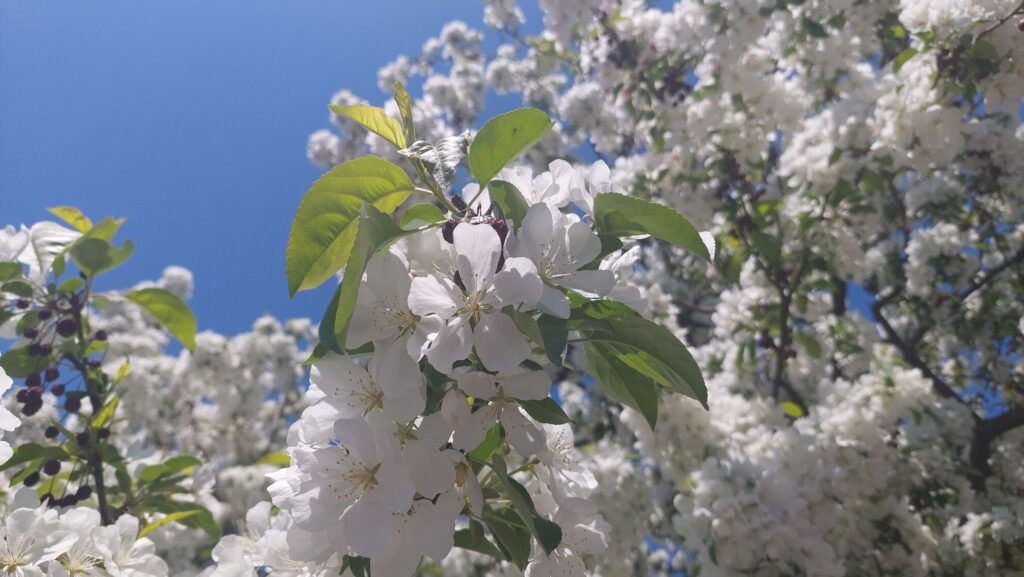
Past tense:
Kvetl/a jsem – I bloomed
Kvetl/a jsi
Kvetl/a
Kvetli/y jsme
Kvetli/y jste
Kvetli/y
E.g. Celá louka kvetla. – The entire meadow was in bloom.
13. mást = confuse (imperfective)
Present tense:
Já matu – I confuse (usually followed by an object)
Ty mateš
On, ona mate
My mateme
Vy matete
Oni matou
E.g. Tohle mě mate. – This confuses me.
Past tense:
Mátl/a jsem – I confused
Mátl/a jsi
Mátl/a
Mátli/y jsme
Mátli/y jste
Mátli/y
E.g. Ty cedule mě mátly a proto jsem se rozhodl jet jinudy. – The signs confused me, so I decided to go a different way.
14. plést = knit (imperfective)
You might think the verb for knitting is not important (unless you actually knit) but it’s actually a good base for another meaning, which I will show you after we go through the conjugations for knitting.
Present tense:
Já pletu – I knit / am knitting
Ty pleteš
On, ona plete
My pleteme
Vy pletete
Oni pletou
E.g. Pletu svetr. – I am knitting a sweater.
Past tense:
Pletl/a jsem – I knitted
Pletl/a jsi
Pletl/a
Pletli/y jsme
Pletli/y jste
Pletli/y
E.g. Maminka u televize pletla. – Mom was knitting in front of the TV.
Now, when you add si to it, it means to get mixed up, to confuse something with something else.
E.g. Pletu si měsíc červen a červenec. – I am confusing the month of June and July.
So, what do you think? These verbs are not scary after all! Choose the ones you want to learn, say them out loud a couple of times (já form will give you a hint for the rest of the persons) and learn them in a sentence.
Hodně štěstí!
